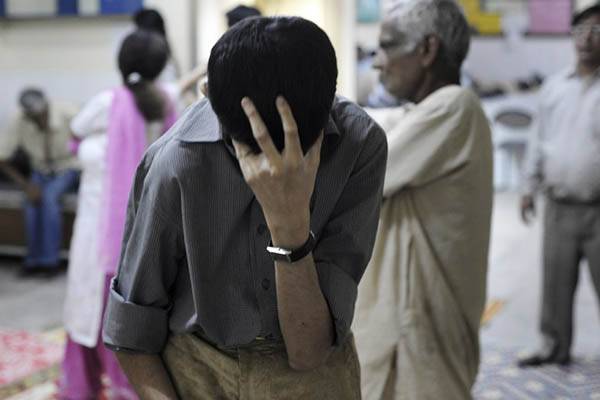Mental health in Pakistan is one of those taboo topics nobody wants to broach. And now with the Supreme Court ruling that schizophrenia isn't a mental illness, there isn't a more pertinent time to have this discussion.
It is not surprising then that the people, who do find the courage to seek help, are at a loss when it comes to explaining their emotional state. They are unable to express their feelings not just to the therapist but also to themselves. We often hear clients say ‘I don’t know what is happening with me.’ ‘I was never like this, what is going on with me.’ ‘Why am I like this?' The lack of awareness about your own feelings further stresses out people, that causes abnormal thoughts or behavior.
‘I am feeling low as my blood pressure is low.’ ‘Not in a good mood because of a headache.’ Often we hear these as pretexts for mood swings or depression – people find justifying their emotional state with a medical reason easier than accepting that they might have a mental health issue – simply because medical causes are more acceptable to the society than understanding psychological aspect of behaviors. Consequently, it is not only tough to seek help in matters of mental health but it is also difficult to provide psychological support.
I often get messages where people want to seek help but their families are not allowing them to, or that they are afraid of how it will look if someone finds out they are in therapy. Such is the stigma around it. People suffering from Depression are told it is a phase and asked to get over it. Anxiety is taken as over-thinking. Perhaps the most important organ of our body that controls our behaviors, movements, everything – the brain, our mind – is also the most ignored one.
We cannot blame the society much as there is very little information available on this issue. Up until 2001, constitutionally mental health was referred to as the Lunacy Act (1912). Now who would want to associate oneself with something that the law itself belittles. It was in 2001 that a Mental Health Ordinance was passed – one, which does not even meet the criteria set by World Health Organization (WHO). A study suggests that 10 – 20% of the population of Pakistan suffers from mental health issues, while less than 2% is allocated to it out of the Health Care expenditure in Annual Budget. Sindh spends about 4.7M out of its 14B health budget.
Mental Health awareness in Pakistan can be summed up by the fact that people do not even know the difference between a Psychiatrist, Psychologist and a Psychotherapist. People head to a Psychiatrist and complain of not getting enough time and only pills – not realizing that that is essentially the job of Psychiatrists. They diagnose, prescribe pills or refer you to Psychologists or Psychotherapists for counseling. Counseling - Talk Therapy – is Psychologists/Psychotherapists domain. Most Psychologists opt for Research, while Clinical or Counseling Psychologists are closer to Psychotherapists in the work they do. However, Psychotherapists cannot make diagnosis or prescribe medication.
I have clients come in complaining about medications not making a difference, how can it? Medication wont resolve say GAD (Generalized Anxiety Disorder) until the cause behind it is resolved. For which we need behavioral or solution-focused therapies. Xanax can help you sleep at night but it will not magically solve your problems when you wake up – those need to be addressed.
Sometimes people already know what they need to do in order to improve their psychological state, at times they need validation for what they are thinking, other times they are reluctant to do the needful and want to find another way out. One misunderstanding here is that Mental Health Professionals will tell you what needs to be done. Countless times I have heard clients ask me ‘What should I do? You tell me what to do!’ – this is yet another myth, Mental Health Professionals are trained to help you introspect and figure out the best possible outcome for you that can give you a peaceful life while not interrupting the peace of others around you. Using various therapies, we help empower you to improve your cognition, help see things from different perspectives.
Counseling teaches one to deal with negative thoughts and feelings, utilize them in a positive manner that can uncover solutions instead of causing damage to the situation. It helps you understand yourself, your circumstances from a broader perspective. Sometimes therapies just help you release stress by confiding in a professional who can keep your thoughts and feelings confidential. Basic techniques of taking long deep breaths or tapping (tap your hands by your side or on thighs while sitting down and count backwards 10-1) can do wonders during Anxiety or Panic attacks.
Counseling is a therapeutic alliance between the client and therapist – it is not a quick fix to a problem neither will the mental health professional simply tell you what to do, but it is a process that builds a strong productive relationship between you and your counselor which leads to finding closure and empowering oneself to be self-contend in dealing with difficulties head on.
While Mental Health is surrounded by stigmas in our society, acceptance to consider it a necessity seems nearby. We now have organizations that offer Psychological support; Hospitals do have Psychiatrists on board even if they haven’t gotten accustomed to providing in-patient counseling as offered by hospitals abroad. It’s a slow progress but at least there is progress.






